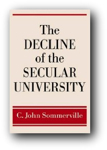
C. John Sommerville is Professor Emeritus of History at the University of Florida. In 2006, Oxford University Press published a little book of his called The Decline of the Secular University, a selection from which was featured in the Chronicle of Higher Education. He will also be the featured speaker at this summer’s Midwest Faculty Conference, so I thought I should read his book before spending a week with him in the cabins along Lake Huron.
Sommerville summarizes his book as follows:
My thesis in what follows is, first, that the secular university is increasingly marginal to American society and, second, that this is a result of its secularism. In effect, I mean that questions that might be central to the university’s mission are too religious for it to deal with. (4)
In particular, he points to universities’ inability to shape public opinion on such issues as politics, science, and business, and the overall anti-intellectualism of American society.
InterVarsity’s mission is to campuses, primarily because of God’s love for the students and faculty on those campuses, but secondarily because of the strategic role of campuses in the world. And ESN’s Vision is centered on the importance of the university, so his position on universities’ marginal role initially struck me as counter to ESN’s. But my fellow blogger Tom Grosh is in the habit of referring to campus ministry as “para-academic” – adding something to the university that the university itself won’t or can’t. And InterVarsity has recently explained one purpose of its campus communities as:
While today’s Liberal Arts college or university prides itself on preparing students intellectually for successful futures, little thought is taken by schools about preparing students spiritually for adult life. But spiritual preparation is as essential as intellectual development to live responsibly and be a whole person.
So, I think Sommerville and InterVarsity agree that America’s secular universities neglect a major component of life: the spiritual. Sommerville goes even further than InterVarsity, however, arguing that secularism itself erodes the mission and vitality of the university. Christians frequently argue that the exclusion of religion from secular universities is bad for students (or, at least, bad for Christians), but Sommerville’s point is that the exclusion of religion is bad for the university itself and for society in general.
I won’t summarize the entire book here, and I’d be interested in a fuller chapter-by-chapter discussion at some point. For instance, in one chapter, “Losing a Sense of History,” Sommerville calls for a renewed focus on Western civilization courses as a foundation of education – not because other cultures aren’t worth studying, but because, in Sommerville’s words, “[o]nce you have some idea who you are, then your study of others will be more meaningful” (101), and I am very interested in hearing the response of American Christians from nonWestern backgrounds to Sommerville’s argument.
If you are interested in leading a discussion of the book, or simply digging into more on your own, Sommerville has written a discussion guide for InterVarsity Faculty Ministry. If you’re interested in interacting with John, consider coming to our Midwest Faculty Conference, where you’ll have a week with John and other Christian faculty in a relaxing, camp-like atmosphere.
What do you think of Sommerville’s basic thesis, that America’s universities are declining in significance because of their secularism?
The former Associate Director for the Emerging Scholars Network, Micheal lives in Cincinnati with his wife and three children and works as a web manager for a national storage and organization company. He writes about work, vocation, and finding meaning in what you do at No Small Actors.

Leave a Reply